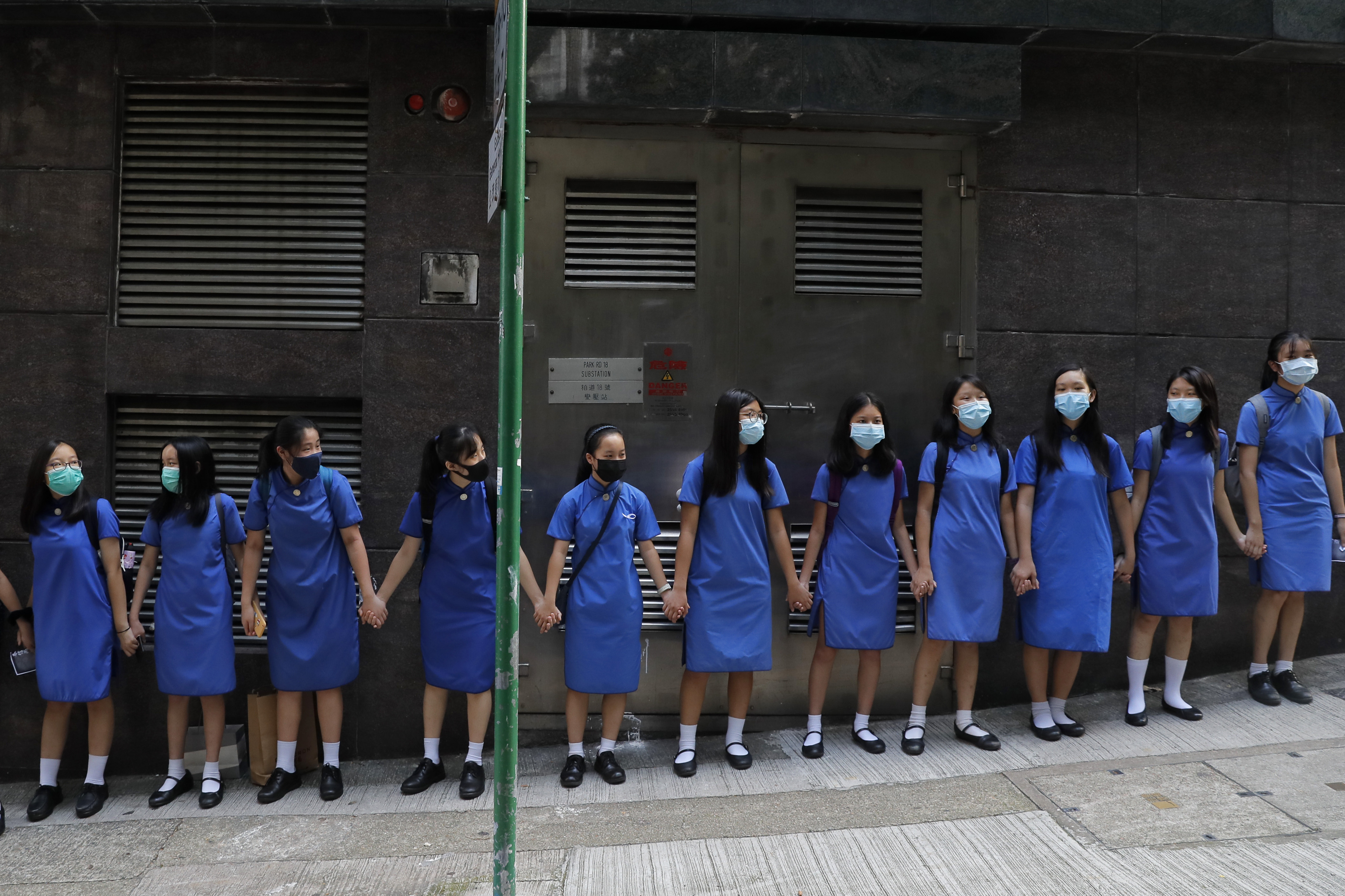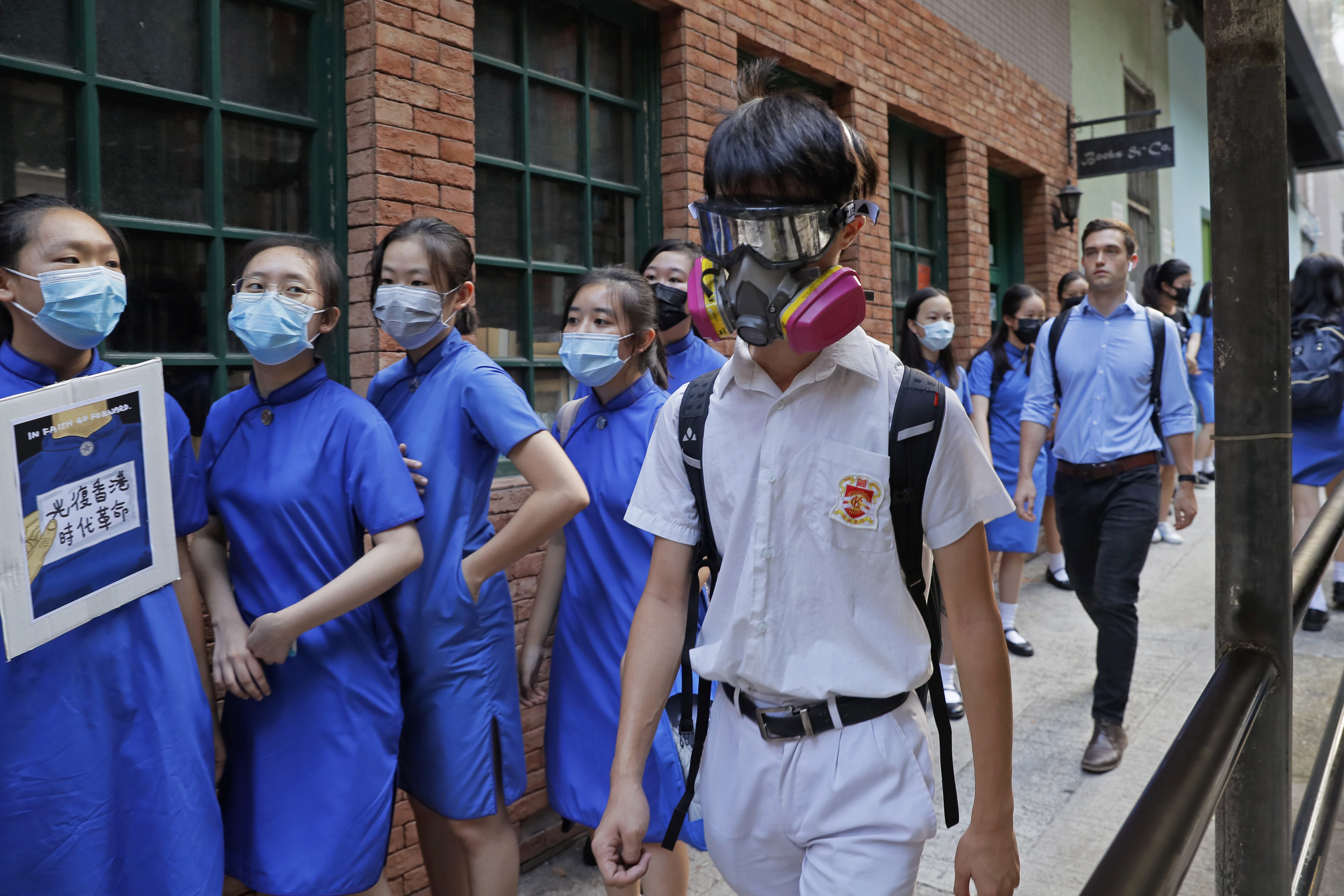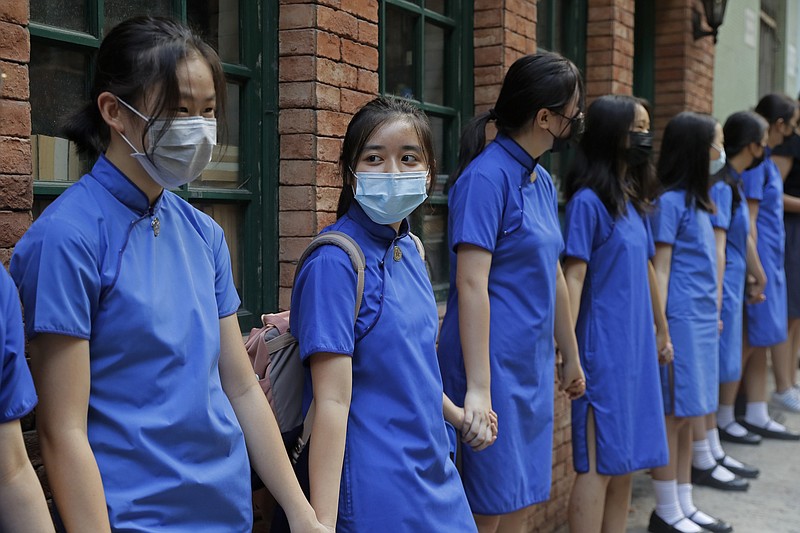HONG KONG - Thousands of students formed human chains outside schools across Hong Kong on Monday to show solidarity after violent weekend clashes between police and activists seeking democratic reforms in the semiautonomous Chinese territory.
The silent protest came as the Hong Kong government condemned the "illegal behavior of radical protesters" and warned the U.S. to stay out of its affairs.
Thousands of demonstrators held a peaceful march Sunday to the U.S. Consulate to seek Washington's support, but violence erupted hours later in a business and retail district as protesters vandalized subway stations, set fires and blocked traffic, prompting police to fire tear gas.
Hong Kong Chief Executive Carrie Lam agreed last week to withdraw an extradition bill that sparked a summer of protests, but demonstrators want other demands to be met, including direct elections of city leaders and an independent inquiry into police actions.
Protesters in their Sunday march appealed to President Donald Trump to "stand with Hong Kong" and ensure Congress passes a bill that would impose economic sanctions and penalties on Hong Kong and mainland China officials found to suppress democracy and human rights in the city.
Hong Kong's government expressed regret over the U.S. bill, known as the Hong Kong Human Rights and Democracy Act. It said in a statement Monday that "foreign legislatures should not interfere in any form in the internal affairs" of Hong Kong and that the city will safeguard its own autonomy.
 Students wearing mask hold hands to surround St. Stephen's Girls' College in Hong Kong, Monday, Sept. 9, 2019. Thousands of demonstrators in Hong Kong urged President Donald Trump to "liberate" the semiautonomous Chinese territory during a peaceful march to the U.S. Consulate on Sunday, but violence broke out later in the business and retail district as police fired tear gas after protesters vandalized subway stations, set fires and blocked traffic. (AP Photo/Kin Cheung)
Students wearing mask hold hands to surround St. Stephen's Girls' College in Hong Kong, Monday, Sept. 9, 2019. Thousands of demonstrators in Hong Kong urged President Donald Trump to "liberate" the semiautonomous Chinese territory during a peaceful march to the U.S. Consulate on Sunday, but violence broke out later in the business and retail district as police fired tear gas after protesters vandalized subway stations, set fires and blocked traffic. (AP Photo/Kin Cheung)Trump has suggested it's a matter for China to handle, though he also has said that no violence should be used. Political analysts suggest his response was muted to avoid disrupting talks with China over their tariff war.
High school and university students across Hong Kong held hands on Monday, following similar protests last week, forming long human chains that snaked into the streets outside their schools.
Many also rallied against what they viewed as excessive use of force by police, with one student carrying a placard that read "Stop violence, we are not rioters."
Anger was fueled over the weekend after images of a youth being bloodily beaten up by riot police at a subway station were widely shared on social media. The boy, who didn't fight back, was pinned to the floor and appeared unconscious in a pool of blood.
Police public relations chief Tse Chun-chung said Monday that police are investigating the case.
He said police were doing their best to handle escalating violence, with "radical" protesters attacking police and trying to snatch their weapons. He said 157 people had been detained since Friday, bringing the number of those held since June to over 1,300.
Hong Kong journalists, some wearing helmets and gas masks, complained at the police briefing that riot police had used pepper spray and threatened media personnel covering the weekend clashes.
 Students wearing mask hold hands to surround the St. Stephen's Girls' College in Hong Kong, Monday, Sept. 9, 2019. Thousands of demonstrators in Hong Kong urged President Donald Trump to "liberate" the semiautonomous Chinese territory during a peaceful march to the U.S. Consulate on Sunday, but violence broke out later in the business and retail district as police fired tear gas after protesters vandalized subway stations, set fires and blocked traffic. (AP Photo/Kin Cheung)
Students wearing mask hold hands to surround the St. Stephen's Girls' College in Hong Kong, Monday, Sept. 9, 2019. Thousands of demonstrators in Hong Kong urged President Donald Trump to "liberate" the semiautonomous Chinese territory during a peaceful march to the U.S. Consulate on Sunday, but violence broke out later in the business and retail district as police fired tear gas after protesters vandalized subway stations, set fires and blocked traffic. (AP Photo/Kin Cheung)Separately, well-known Hong Kong activist Joshua Wong was released Monday, a day after he was detained at the airport.
Wong, a leader of Hong Kong's 2014 pro-democracy protest movement, was among several people held last month and charged with inciting people to join a protest in June. His prosecution comes after his release from prison in June for a two-month sentence related to the 2014 protests.
A court said Wong's overseas trips had been approved earlier and his detention was due to procedural errors.
Wong, who visited Taiwan last week, told reporters before he flew off to Germany and then the U.S. that he would continue to raise global awareness about Hong Kong's fight for democratic reforms.
German Foreign Minister Heiko Maas welcomed Wong's release and said he was prepared to meet him.
"We hope that the conflict there will be de-escalated bit by bit, but without that entailing the rights people are entitled to - namely the right to express their opinion, including on the street - in any way being limited," Maas told reporters in Berlin.
